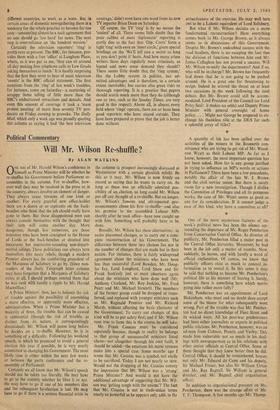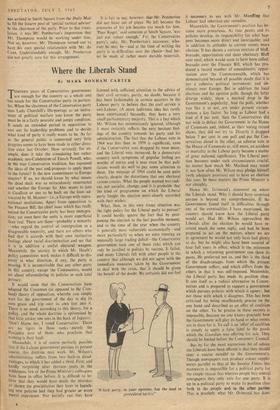Political Commentary
Will Mr. Wilson Re-shuffle?
By ALAN WATKINS
ONE test of Mr. Harold Wilson's confidence in himself as Prime Minister will be whether he
re-shuffles his Government before Parliament re- assembles in the autumn. For re-shuffles, how- ever well they may be received in the press or in the country, always involve an element of danger. They always cause tensions of one kind or another. For every grateful new office-holder there are a dozen or so aspirants on the back- benches who think that the job should really have gone to them. But these disappointed men can always console themselves with the thought that their turn will come another day. More dangerous, though less numerous, are those ministers who have been consigned to the House of Lords or the back-benches or shunted into innocuous but impressive-sounding non-depart- mental sidings. These politicians can always turn themselves into nasty rebels, though a modern Premier always has the comforting precedent of the Marquess of Salisbury to go by. (Since non- readers of the Daily Telegraph letter column may have forgotten that a Marquess of Salisbury exists at all, I should perhaps remind them that he was sunk with hardly a ripple by Mr. Harold Macmillan.) A Prime Minister, then, has to balance the risk of trouble against the possibility of assembling a more effective, or apparently more effective,
administration. When a Prime Minister has a majority of three, the trouble that can be caused
is substantial (though the risk of trouble, as distinct from its nature, is correspondingly diminished). Mr. Wilson will pause long before he decides on a re-shuffle. However, he is in something of a difficulty. Following his weekend speech, in which he promised to avoid a general election this year if possible, he is very nearly committed to changing his Government. The most likely time is either within the next few weeks or between the party conference and the re- assembly of Parliament.
Certainly we all know that Mr. Wilson's speech should not be taken too literally. He may have to go to the country whether he likes it or not. He may have to go if one of his members dies and the subsequent by-election is lost. He may have to go if there is a serious financial crisis in the autumn (a prospect increasingly discussed at Westminster with a certain ghoulish relish). Be this as it may, Mr. Wilson is now firmly on record as saying .that he wants to carry on. As long as there was an officially admitted pos- sibility of an election, so long could Mr. Wilson put off any thought of a re-shUffle. But no longer.
Mr. Wilson's famous and oft-repeated pro- nouncements about his first re-shuffle--and also his promise to the assembled Labour MPs shortly after he took office—have now caught up with him. Something will probably have to be done.
Broadly, Mr. Wilson has these alternatives: to make piecemeal changes, or to carry out a com- plete reconstruction of his Government. The difference between these two choices lies not in the number of changes that are made but in their nature. For instance, there is fairly widespread agreement about the ministers who have been less than successful (Lord Bowden, Mr. Doug- las Jay, Lord Longford, Lord Snow and Sir Frank Soskice); just as most observers agree about the ministers who have done well (Mr.
Anthony Crosland, Mr. Roy Jenkins, Mr. Fred Peart and Mr. Michael Stewart). The members of the former group could be dropped or trans- ferred, and replaced with younger ministers such as Mr. Reginald Prentice and Mr. Richard Marsh, without affecting the basic character of the Government. To carry out changes of this kind will be to put safety first; and if Mr. Wilson runs true to form this is the course he will take. Mr. Frank Cousins must be considered separately because, though in reality he belongs to that group of unsuccessful ministers listed above—not altogether through his own fault, it should be added—the emotions his name arouses make him a special case. Some months ago I wrote that Mr. Cousins was a symbol, not easily to be sacrificed. Today I am not nearly so sure. Would not the dropping of Mr. Cousins convey the impression that Mr. Wilson was a 'strong' Prime Minister? And would it not have the additional advantage of suggesting that Mr. Wil- son was 'getting tough with the unions'? The fact that Mr. Cousins is not in trade-union terms nearly so powerful as he appears only adds to the attractiveness of the exercise. He may well turn out to be a Labour equivalent of Lord Salisbury.
But what if Mr. Wilson decides on a more fundamental reconstruction? Here everything comes back to Mr. George Brown, as it always seems to in discussions of this Government. Despite Mr. Brown's undoubted success with the road hauliers, there is no escaping the fact that the division of functions between him and Mr. James Callaghan has not proved a success. Will Mr. Wilson re-unify the departments? And if so, who will be in charge? Mr. Brown has frequently laid down that he is not going to be pushed around. He is a great one for threatening to resign. Indeed he uttered the threat on at least two occasions in the week following the steel debate. But Mr. Brown could still be accom- modated. Lord President of the Council (or Lord Privy Seal: it makes no odds) and Deputy Prime Minister with general oversight of home policy. .. . Might not George be prepared to ex- change his thankless role at the DEA for such a splendid array of titles?
A quantity of ink has been spilled over the activities of the miners in the Bosworth con- stituency who are trying to get rid of Mr. Wood- row Wyatt as their Labour MP. As far as I know, however, the most important question has not been asked. How far is any group justified in trying to influence an MP's words or actions in Parliament? There have been a few precedents, notably the affair of the late W. J. Brown and the civil service union. But there is surely room for a new investigation. Though I dislike the Committee of Privileges and all its pompous works, the case of Mr. Wyatt seems as good as any for its consideration. If it cannot judge a case of this kind, why have a committee at all?
*
One of the more mysterious features of the week's political news has been the silence sur- rounding the departure of Mr. Roger Pemberton from Conservative Central Office. As director of publicity, Mr. Pemberton filled a major post in the Central Office hierarchy. Moreover, he had been in the job only a matter of months. Now, suddenly, he leaves, and with hardly a word of official explanation. Of course, we know that publicity officers exist as much to conceal in- formation as to reveal it. In this sense it may be said that nothing so became Mr. Pemberton's political life as his manner of leaving it. Surely, however, there is something here which merits going into rather more fully?
Mr. Pemberton was an appointment of Lord Blakenham, who must and no doubt does accept some of the blame for what subsequently went wrong. Part of the trouble was that Mr. Pember- ton had no direct knowledge of Fleet Street and its wicked ways. All his post-war predecessors had been either journalists or experts in political public relations. Mr. Pemberton, however, was an ad-man from Colman, Prentis and Varley. This made him vulnerable not so much in his deal- ings with newspapermen as in his relations with other senior officials at Central Office. Some of them thought that they knew better than he did. Central Office, it should be remembered, houses not only Mr. Edward du Cann and his deputy, Sir Michael Fraser, but also Sir William Urton and Mr. Rex Bagnall. Sir William is general director, and Mr. Bagnall chief organisation officer.
In addition to organisational pressure on Mr. Pemberton, there was the strange affair of Mr. T. F. Thompson. A few months ago Mr. Thomp-
son arrived in Smith Square from the Daily Mail to fill the bizarre post of 'special tactical adviser' to the chairman of the party. Prior to this trans- lation, it was Mr. Pemberton's impression that Mr. Thompson would be working under him. Not so, however. Mr. Thompson turned out to have his own special relationship with Mr. du Cann. Understandably enough, Mr. Pemberton did not greatly care for this arrangement.
It is fair to say, however, that Mr. Pemberton did not leave out of pique. He left because the pressures of his job became too much for him. `Poor Roger,' said someone at Smith Square, 'was just not robust enough.' For the Conservative party's sake, Mr. Pemberton's successor, who- ever he may be—and at the lime of writing the party is in difficulties over the choice---had bet- ter be made of rather more durable materials.











































 Previous page
Previous page